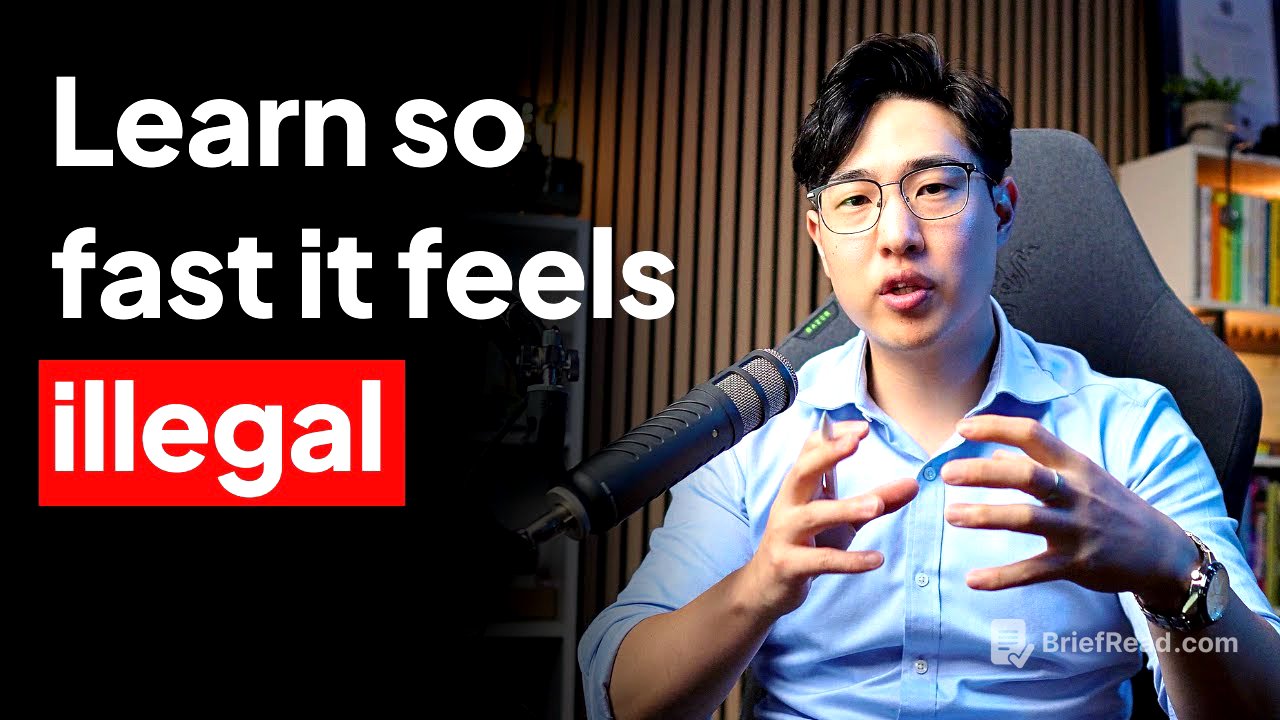TLDR;
This video presents three key productivity principles: the Pareto Principle, the Zeigarnik Effect, and the Championship Mentality. It explains how to apply and supercharge each principle to achieve significant gains in productivity. By focusing on the most impactful tasks, overcoming procrastination, and adopting a strategic mindset towards long-term goals, viewers can unlock an "illegal" level of productivity.
- Pareto Principle: Focus on the 20% of activities that yield 80% of the results.
- Zeigarnik Effect: Start tasks without needing to finish them to reduce procrastination.
- Championship Mentality: Be willing to "lose the game" to gather data and improve long-term strategies.
Intro [0:00]
Justin Sung introduces three productivity principles that can significantly boost output: the Pareto Principle, the Zeigarnik Effect, and the Championship Mentality. He shares his experiences from medical school and teaching thousands of learners worldwide, promising to provide unique insights on supercharging these principles for maximum effectiveness.
The Pareto Principle [0:54]
The Pareto Principle, or the 80/20 rule, suggests that 80% of the impact comes from 20% of the effort. The author shares his experience optimizing flashcards, which consumed a lot of time but didn't yield consistent results. Focusing on the 80% of tasks that produce only 20% of the impact leads to wasted time and frustration. Prioritizing the critical 20% allows for stacked gains and purposeful movement toward goals. Planning and prioritization are essential, as the cost of not planning is higher than the cost of planning. Good prioritization involves making difficult decisions about what to strategically sacrifice. Productivity isn't just about work; it includes breaks, hobbies, and self-care, which are crucial for sustained performance.
Supercharged Pareto [10:24]
The Pareto Principle can be supercharged into the "Pareto Squared" principle by applying it to itself. Break down the top 20% of tasks into their components and identify the 20% of those components that yield 80% of the impact. For example, planning is the most important part of writing an essay. This approach reduces procrastination by focusing on tiny initial steps and increases the success rate by ensuring the most critical part of a task is done well. The author notes that 4% of your time can create 64% of the total impact. He recommends creating a learning system as a high-priority task to improve overall productivity.
The Zeigarnik Effect [14:55]
The Zeigarnik Effect states that tasks are easier to complete when left incomplete. Starting a task creates a desire to finish it, reducing friction and procrastination. The author shares his experience with writing a literature review, where simply starting the process motivated him to complete it. The key is to focus on getting the task to an incomplete state rather than completing it entirely.
Supercharged Zeigarnik [18:55]
The Zeigarnik Effect can be supercharged into the "Zeigarnik Squared" effect by breaking down the initial steps of getting started on a task. For example, before studying, ensure your desk is organized and resources are available. The author also suggests a reverse Zeigarnik Squared effect to deter procrastination by making it difficult to start distracting activities. Automating initial steps using AI and technology can further ease the process.
The Championship Mentality [22:23]
The Championship Mentality involves "losing the game to win the championship." The author uses Toyota as an example, which sacrificed short-term revenue to improve its production process. By losing a game, you gain valuable data to improve your plan and use the Pareto Principle more effectively. Sometimes, focusing on improving skills and learning about yourself is more important than winning an immediate exam.
Supercharged Championship [27:25]
The Championship Mentality can be supercharged by recognizing that gaining certainty depends on actions, not just time. The author emphasizes that taking action and experimenting allows you to learn faster and develop a winning strategy sooner. He advises against passively waiting for solutions and encourages actively seeking information and iterating on your approach. He stresses the importance of making time to learn how to succeed, as failure will make that time for you later.









